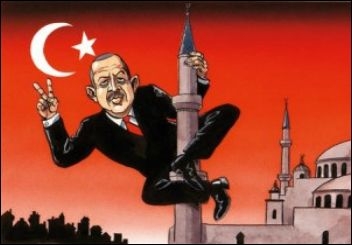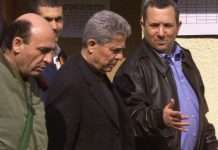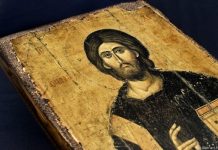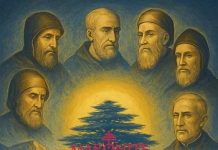Turkey’s War on Christian Missionaries
عزاي بولوت: حرب تركيا على المبشرين المسيحيين
Uzay Bulut/Gatestone Institute/December 30/18
American Pastor Andrew Brunson and American-Canadian evangelist David Byle are among many Christian clerics who have fallen victim to Turkey’s aversion to Christianity. According to Claire Evans, regional manager of the organization International Christian Concern, “Turkey is making it increasingly clear that there is no room for Christianity, even though the constitution states otherwise.”
Today, only around 0.2% of Turkey’s population of nearly 80 million is Christian. The 1913-1923 Christian genocide across Ottoman Turkey and the 1955 anti-Greek pogrom in Istanbul are some of the most important events that largely led to the destruction of the country’s ancient Christian community. Yet, still today in Turkey, Christian missionaries and citizens continue to be oppressed.
“One issue that differentiates Turkey from the rest of the world is that our national identity is primarily shaped by religious identity. What makes a Turk a Turk is not so much due to ethnicity, or the language people speak, but is primarily about being Muslim… A large majority of Turkish people think there is nothing in their history that they should be ashamed of. [They] don’t feel close to Europe or to the Middle East; they basically feel close to only themselves… one striking fact is that we [asked] if everybody would be a Turk, would the world be a better place, and Turks gave a very high rating. No self-criticism whatsoever.” — Professor Ali Çarkoğlu of Koç University, who conducted a survey on nationalism with Professor Ersin Kalaycıoğlu of Sabancı University.
Bishop Luigi Padovese, Apostolic Vicar of Anatolia, Turkey, was murdered in 2010 by his driver, who shouted, “Allahu Akbar” as he slit the priest’s throat. (Image source: Raimond Spekking / CC BY-SA 3.0 via Wikimedia Commons)
The day after American pastor Andrew Brunson was released from Turkish prison, another Christian who had been living for nearly two decades in the country was detained by Turkish authorities, and told that he had two weeks to leave the country — without his wife and three children. The American-Canadian evangelist, David Byle, not only suffered several detentions and interrogations over the years, but he had been targeted for deportation on three occasions. Each time, he was saved by court rulings. This time, however, he was unable to prevent banishment, and left the country after two days in a detention center.
When he tried to return to his family in Turkey on November 20, he was denied re-entry. According to Claire Evans, regional manager of the organization International Christian Concern:
“Turkey is making it increasingly clear that there is no room for Christianity, even though the constitution states otherwise. It is no coincidence that Turkey decided to initiate this process the day after Brunson’s release from prison and that, in doing so, the authorities ignored a court order. We must keep the Byle family in our prayers during this period of difficult separation.”
Brunson and Byle are among many Christian clerics who have fallen victim to Turkey’s aversion to Christianity. In its annual Human Rights Violations Reports, published since 2009, Turkey’s Association of Protestant Churches details Turkey’s systematic discrimination against Protestants, including verbal and physical attacks; nor does the Turkish government recognize the Protestant community as a “legal entity,” denying it the right to freely establish and maintain places of worship.
Turkey’s Protestants cannot open their own schools or train their own clerics, forcing them to rely on support of foreign church leaders. Still, several foreign religious workers and church members have been denied entry into Turkey, refused residence permits or deported.
Although missionary activities are not illegal according to the Turkish criminal code, both foreign pastors and Turkish citizens who convert to Christianity nevertheless are treated as pariahs by authorities and much of the public. It is no wonder that this is the case, given the years of anti-Christian “reports” by state institutions that shape government policy.
For example:
In 2001, after receiving a report from Turkey’s National Intelligence Organization (MIT), the National Security Council (MGK) declared Christian missionary activities a “security threat” and stated that “required precautions should be taken against [their] divisive and destructive activities.”
In 2004, the Ankara Chamber of Commerce (ATO) issued a report claiming that “missionary activities provoke ethnic and religious separationist aspirations and target the unitary structure of the state.”
In 2005, State Minister Mehmet Aydın said: “We think that [Christian] missionary activities aim to destroy the historical, religious, national and cultural unity… it is seen as an extremely planned movement with political goals.”
In 2006, the Turkish Armed Forces (TSK) prepared a report referring to Christian missionaries as a “threat” and emphasized that legal regulations needed to be made to prevent their activities. That same year, Ali Bardakoğlu, then-head of Diyanet (the government-funded Directorate of Religious Affairs), said in televised comments that it is “Diyanet’s duty to warn the people about missionaries and other movements that threaten society.”
In 2007, Niyazi Güney, a Justice Ministry official, said that “missionaries are even more dangerous than terrorist organizations.”
Such public denunciations of Christian missionaries have had concrete and devastating consequences.
In 2006, for instance, a Protestant church leader named Kamil Kıroğlu, a Muslim convert to Christianity, was beaten unconscious by five men, one of whom shouted, “Deny Jesus or I will kill you now,” and another yelled, “We don’t want Christians in this country!”
Also in 2006, Father Andrea Santoro, a 61-year-old Roman Catholic priest, was murdered while praying in the Santa Maria Church in Trabzon. Five months later, a 74-year-old priest, Father Pierre François René Brunissen, was stabbed and wounded in Samsun. The perpetrator said that he had committed the act against the priest to protest “his missionary activities.”
In April 2007, three Christians were tortured to death in the Zirve Bible Publishing House massacre. In November of the same year, an Assyrian priest, Edip Daniel Savcı, was kidnapped. One month later, a Catholic priest, Adriano Franchini, was stabbed and wounded during a Sunday church service. The priest reportedly had been “accused of missionary activities” by some websites.
In June 2010, Bishop Luigi Padovese, Apostolic Vicar of Anatolia, was murdered by his driver, who shouted, “Allahu Akbar” (“Allah is the greatest”) as he slit the priest’s throat. At his trial, the murderer said that the bishop was a “false messiah,” then twice in the courtroom he loudly recited the adhan (Islamic call to prayer).
Despite its current tiny and disintegrating presence in Turkey, Christianity has a long history in Asia Minor (part of contemporary Turkey), the birthplace of numerous apostles and saints, among them Paul, Luke, Ephrem, Polycarp, Timothy, Nicholas and Ignatius. Many events recorded in the Bible took place in that area. The indigenous peoples of the land — Armenians, Assyrians and Greeks — are among the first nations to embrace the Christian faith.
The first seven Ecumenical Councils were also held in the area that today is Turkey. It was in Antioch (Antakya) where the followers of Jesus were called “Christians” for the first time in history and where St. Peter established one of the earliest churches. Edessa (Urfa in southeast Turkey) was an early center of the Assyrian (Syriac) Orthodox Church. The ancient Greek city of Byzantium (a.k.a. Constantinople — the current Istanbul) was a hub of Christianity and the Hagia Sophia, built there in the 6th century, was the largest church in the world — until Ottoman Turks invaded the city in 1453 and converted the church into a mosque. Since then, Christians in the region have been under Muslim domination.
Today, only around 0.2% of Turkey’s population of nearly 80 million is Christian. The 1913-1923 Christian genocide across Ottoman Turkey and the 1955 anti-Greek pogrom in Istanbul are some of the most important events that largely led to the destruction of the country’s ancient Christian community. Yet, still today — even after Turkey joined the Council of Europe in 1949 and NATO in 1952 — Christian missionaries and citizens continue to be oppressed in Turkey.
There seem to be two reasons for this. The first has to do with Islam’s view of kafirs (“infidels”). As Dr. Bill Warner, director of the Center for the Study of Political Islam (CSPI), explains:
“The Koranic doctrine about kafirs says they are hated and are Satan’s friends. Kafirs can be robbed, killed, tortured, raped, mocked, cursed, condemned and plotted against.”
Warner also describes the destruction of Greek Christian civilization in Anatolia:
“[T]he process of annihilation took centuries. Some people think that when Islam invaded, the Kafirs had the choice of conversion or death. No, absolutely not. Sharia law was put into place and the Christian dhimmis continued to have their ‘protected’ status as People of the Book who lived under the Sharia law. The dhimmi paid heavy taxes, could not testify in court, hold a position of authority over Muslims and was humiliated by social rules. A dhimmi had to step aside for the Muslim, offer him his seat, could not carry a weapon and defer to a Muslim in every way. In all matters of society the dhimmi had to yield to the Muslim. Over the centuries, the degradation, lack of rights and the dhimmi tax caused the Christian to convert. It is the Sharia that destroys the dhimmis.”
Centuries later — in spite of the fact that the Turkish constitution is not based on Sharia law — the thinking and behavior of most Turks are still largely Islamic. According to Professor Ali Çarkoğlu of Koç University, who conducted a survey on nationalism with Professor Ersin Kalaycıoğlu of Sabancı University:
“One issue that differentiates Turkey from the rest of the world is that our national identity is primarily shaped by religious identity. What makes a Turk a Turk is not so much due to ethnicity, or the language people speak, but is primarily about being Muslim… A large majority of Turkish people think there is nothing in their history that they should be ashamed of. [They] don’t feel close to Europe or to the Middle East; they basically feel close to only themselves. This global identity is something strange to Turkish mind. Turks are Turks and one striking fact is that we [asked] if everybody would be a Turk, would the world be a better place, and Turks gave a very high rating. No self-criticism whatsoever.”
The other reason for Christian persecution in Turkey appears to be a widespread fear — bordering on paranoia — that Christians aim, through proselytizing, to take back the lands of Turkey that they used to possess before the Turkish conquest. A 2001 report by the National Intelligence Organization (MIT), for instance, claims that “missionaries refer to Pontos [an ancient Greek land] in the Black Sea area, Yazidism, the Chaldean [church] and Christian Kurds in southeast Turkey, Armenians in eastern Turkey and the ancient Christian lands in the Aegean region and in Istanbul to impress people and win them over.”
In addition, the 2004 Turkish army report alleges that 10% of the entire population of Turkey will be Christian by the year 2020.
Ironically, before the 1913-1923 Christian genocide, the population of the territory that is now Turkey was about 14 million, approximately one third (4.5 million) of which was Christian. The genocide largely emptied the Ottoman Empire and current Turkey of its Christian population, creating an almost entirely Muslim country.
Despite this criminal history, many Turks still target Christians unapologetically. Many public figures — including politicians, academics, police and labor unions — demonize missionaries, accusing them of engaging in “separatist,” “menacing,” “aggressive,” “destructive” and “terrorist” activities.
These people seem to be engaging in projection, as it is Islamic jihadists who have violently invaded and taken over foreign lands and turned non-Muslims into slaves or second-class subjects of their empire — something that many Turks proudly endorse and glorify in their own history. The official website of the Turkish Armed Forces, for instance, proudly dates the establishment of the Turkish military to “209 BC, during the Great Hun Empire,” whose rulers and soldiers, historian Joshua J. Mark writes, “brought death and devastation wherever they went,” including Europe. The Turkish army, a member of NATO, also boasts about Turks having “subjugated and dominated numerous peoples, nations, and states over a wide-ranging geography extending from Asia to Europe, and Africa.”
Put in this context, from Turkey’s point of view, the persecution of pastors Brunson and Byle makes perfect sense.
*Uzay Bulut, a Turkish journalist born and raised a Muslim, is a Distinguished Senior Fellow at Gatestone Institute and currently based in Washington D.C.
© 2018 Gatestone Institute. All rights reserved. The articles printed here do not necessarily reflect the views of the Editors or of Gatestone Institute. No part of the Gatestone website or any of its contents may be reproduced, copied or modified, without the prior written consent of Gatestone Institute.























